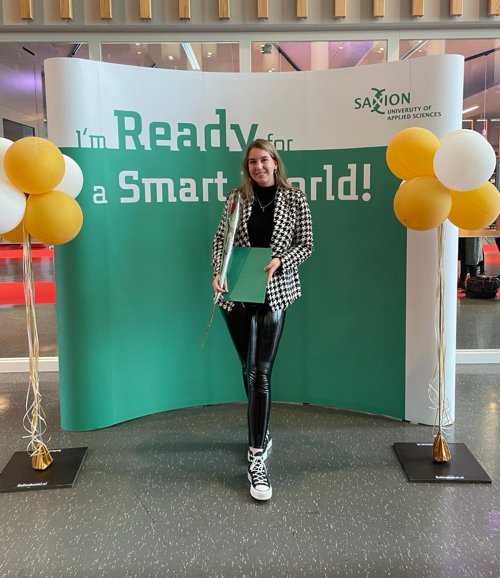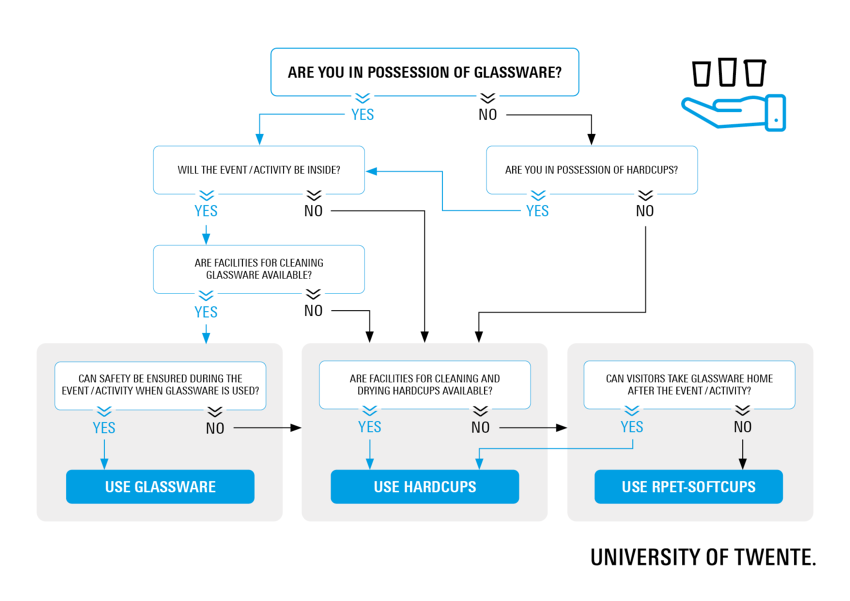Now that disposable cups have been phased out at UT, alternatives are needed. When it comes to events, finding the best solution is not always so simple. Selina Wassen, a Facility Management student at Saxion University in Enschede, conducted her thesis on this subject on behalf of University of Twente. Are you organising an event or activity on campus? The decision tree she created will help you choose the right cup return system.
The challenge
Selina explains: "I found it very difficult to find a suitable place for my thesis. Through mutual contacts at my work as a manager at FC Twente's catering, I ended up at UT's SEE programme. The first step was to have conversations with UT employees: what are they up against?"
"These conversations revealed that there are still gains to be made in terms of waste reduction at UT events. Also, new SUP (single-use plastic) guidelines have been in place since July of this year. Basically a 'perfect' problem for my thesis, which led to the following question: 'We are curious to know which cup return system suits us best. Can you write an advisory report on this?'"

The research
"During the course of the research, it became clear pretty quickly that there would not be one size fits all solution", Selina says. "This is because there are many different events and activities at UT. From small get-togethers for a department, to big events like the Kick-in closing party. In addition, the many conversations I had with other event organisers revealed that the necessary knowledge is not always present there either. This gave me and my supervisor Birgit Dragtstra, Policy Officer for Environment and Sustainability, the idea of providing the knowledge to these event organisations so that they can decide for themselves what suits their event the best."
The results of Selina's research are presented in a decision tree. "My advice is to use reusable cups. But every event is different, of course, hence this decision tree. A cup return system consists of several facets. For example, do you use glass, hardcups or softcups? And is your event open or closed? After following the decision tree, the organiser will know which cup return system is the most suitable", she says proudly.

The first component of the cup return system selection tool
Sustainable choices made practical for the user
Selina's so-called 'cup return system selection tool' can now be found on UT's service portal. "My thesis showed me that you can achieve a lot as a facility employee when it comes to sustainability," she said. "It's nice that we can make sustainable choices practical for the user in this way."
And then: "I think it's very cool that something was actually done with my results and that I really contributed to something! I would like to sincerely thank everyone at UT for the help and opportunities I have received here. If you happen to be at a festival anytime soon, hand in your cups!" she concludes with a wink.
Sustainability at ut
Sustainability is an important priority area of Shaping2030, the University of Twente’s strategic plan. In addition to finding sustainable solutions for societal issues, the UT wants to set a good example of what it means to be a sustainable organisation. To reach this goal, the ambitions of Shaping2030 need to be put into practice. Many members of the UT community are hard at work translating the sustainability objectives into our work on campus – transforming the way we work, teach, learn, travel, build and more. In this series, we invite them to talk about what motivates them, what the role of sustainability is in their day-to-day work, and what they would like to achieve at our university.
Want to find out more about sustainability at UT? Please go to utwente.nl/sustainability.
Written by Stef Meilink





